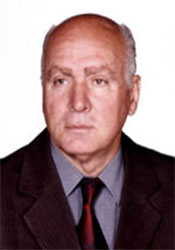If it can happen to him, what about us?

An interview with Jehona Binishi
Every year, an estimated 25 000 people in the European Union die from serious resistant bacterial infections, most of which are acquired in hospitals. No health system is immune from this event. This is just one example from the WHO European Region.
“My father, Professor Riza Binishi, was a wonderful man, a very well known and highly respected surgeon. He was an inspiration to many people, and I became a doctor in his footsteps. He became Dean of the Medical Faculty at a large university in my country, and he helped as the lead doctor and surgeon, saving hundreds of lives. He worked constantly, all the more after my mother died.”
“He was diabetic for more than 20 years, and after he retired, his circulation became a cause for concern, so finally he had to go into hospital to have his toe amputated. After the operation, his blood pressure was too low, his heart was causing problems and his general condition deteriorated. After four or five days in intensive care, his general condition got much worse. There was no real diagnosis, and he begged us not to leave him there. He said, ‘Take me home, it looks like they are just experimenting here.’”
An infection from antibiotic-resistant bacteria
“So we decided to take him to Berlin, Germany. It was a big decision, but we thought it was a risk worth taking, although it cost us a fortune. He went in a private plane to a special and distinguished cardiothoracic hospital. He arrived in very poor condition. They found that he had the new antibiotic-resistant organism New Delhi metallo-β-lactamase 1, or NDM-1. He had it in his lungs, his leg, his urine catheter – it was everywhere; he was in a state of sepsis.”
“They isolated him in quarantine, everything was disinfected, nobody was allowed in without infection control measures, it was terrifying, but it was treated very seriously. They did not want the bug to spread. In my country, they would just say, ‘Oh you’re his children, go in.’”
“Because his coronary arteries were 90% closed, they carried out three bypass operations and he improved. But two or three days later, the infection returned aggressively. They tried all kinds of antibiotics. I think he knew what was happening; we kept talking to him. We told him he was in Germany. He had a tear in his right eye, I think he knew perfectly well. He battled on for six weeks; he was such a strong man. Everyone tried so hard, but in February 2011 his system finally just collapsed. He was 73.”
“We do not know how the infection started, but we were told that there had been a patient in the intensive care unit of our national hospital before, so it was probably in the tubes that were inserted into him. My father gave all his working life to health, out at all hours, and working so hard.”
Health professionals also at risk
“It is not just patients who are threatened by drug resistance. Colleagues and I, we all know that anyone who works in the conditions we work in also puts themselves at risk. The conditions are very poor. Poor management and too little money.”
“All the work we do can go to water if antibiotic resistance is not reduced. In our country you can get antibiotics everywhere without prescriptions. I know my father had a serious condition, but if we cannot reduce antibiotic-resistant infections, the future is very bleak. For us it has been horrible of course, and my first baby is due this month. He will never see the baby.”
“This can happen to anyone. People have said, ‘If it can happen to him, what about us?’ And they are right.”



